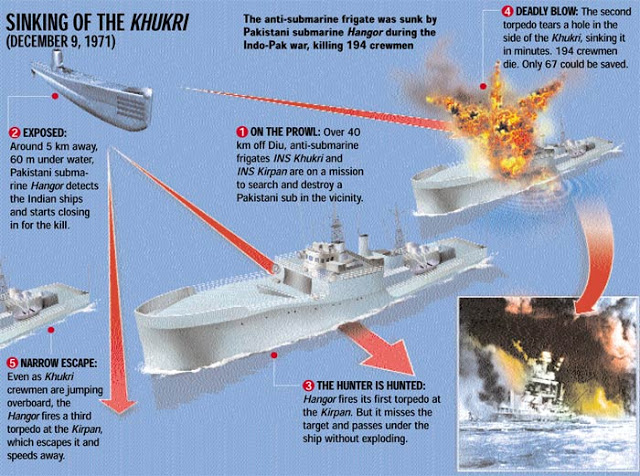Field Marshal Manekshaw on India-Pakistan War of 1971
By RiazHaq
CA
Talking with Karan Thapar on BBC's Face-to-Face about the 1971 India-Pakistan war, India's Field Marshal Sam Manekshaw said :
"About the 5th day of the (1971) conflict in (East Pakistan)...everything had gone wrong (for India); the (Indian) Navy had lost the Khukri; our (India) Air Force has lost a lot of aircraft on the ground; my (Indian Army's) advances in Bangladesh were halted......The Pakistan Army in East Pakistan fought very gallantly but they had no chance; they were a thousand miles away from their base; I had 8 or 9 months of preparation; I had almost 50:1 advantage; they had no chance but they fought very gallantly."
Clearly, Indian Army Chief Sam Manekshaw was the victor of the 1971 war but he was also honest in acknowledging the fact that he had all the advantages over his enemy Pakistan....in fact, he said he had "almost 50:1 advantage".
Besides praising Pakistan Army's gallantry, the Field Marshal also mentioned the losses suffered by the Indian Air Force and the Indian Navy. Let's look at what he was talking about.

Sinking of Indian Navy Frigate INS Khukri
Pakistan Navy submarine PNS Hangor sunk Indian warship INS Khukri off the coast of Diu, Gujarat on December 9, 1971, the first such sinking of a warship since World War II by a submarine. 194 Indian Navy sailors died in the sinking that has been described in detail by the Indian Defense Review in 2014 .
INS Kirpan, another Indian warship which was close by when the attack took place, fled the scene rather than attempt to rescue the sailors on board Khukri. Had Kirpan mounted rescue, at least some of the lives of the194 people (18 officers and 176 sailors) who perished in the sinking of INS Khukri, could have been saved.
A book by retired Major General Ian Cardozo of the Indian Army on the sinking of Khukri has recorded the dismay of some of the survivors at the cowardice INS Kirpan's captain and staff.
“We were hoping that Kirpan, our sister ship, would come to rescue us but we saw her sailing away from the area”, Commander Manu Sharma, a survivor of Khukri, has been quoted by Cardozo.
“An early rescue was what everyone hoped for. We thought that at least INS Kirpan would send boat for our rescue, but no rescue boat came from INS Kirpan,” Lt Commander SK Basu, who was aboard Khukri and survived the Pakistani attack, told Cardozo.
Prior to the Khukri sinking, the Indian Navy had launched missile attacks on the Karachi port and destroyed an oil terminal causing a huge oil fire that lit up the night sky.
After the sinking of Khukri, the Indian Navy ceased its attacks on Karachi and moved the focus of its operations to East Pakistan ports like Chittagong and Cox's Bazar. To date, INS Khukri is the only ship lost in combat in the history of the Indian Navy.
Indian Air Force Losses
Pakistan Air Force struck Indian air bases and destroyed scores of Indian Air Force fighter aircraft sitting on the ground as acknowledged by Field Marshall Manekshaw in his interview with Karan Thapar.
Legendary USAF pilot General Chuck Yeager observed the performance of the Pakistan Air Force in 1971 war. Here's what he wrote in his autobiography "The Right Stuff":
"This air force (the PAF), is second to none...The (1971) air war lasted two weeks and the Pakistanis scored a three-to-one kill ratio, knocking out 102 Russian-made Indian jets and losing thirty-four airplanes of their own. I'm certain about the figures because I went out several times a day in a chopper and counted the wrecks below...They were really good, aggressive dogfighters and proficient in gunnery and air combat tactics. I was damned impressed. Those guys just lived and breathed flying. "
Ground War on the Western Front
There is a myth that Pakistan lost the 1971 war not just in the East but also on the western front. India did take territory in far-flung, desolate and uninhabited areas of negligible importance but lost more of the fertile land in strategic areas.
Here's an except from Indian Defense Review on the 1971 ground war on western front:
"The major Indian gains claimed in terms of area were about 3,200 square kilometers in the Ladakh region under Lt Gen Sartaj Singh and 1,200 square kilometers. under Lt Gen G GBewoor in the Rajasthan Desert. In both regions these gains lay in far-flung, desolate, uninhabited and difficult areas of negligible economic, strategic and political value which could hurt the rulers of Pakistan only in their prestige. On the other hand, Sartaj Singh lost the area of Chhamb, where the aftermath of the refugee problem still haunts the Jammu and Kashmir administration. The loss of the Kasowala bulge, the Hussainiwala enclave and the Fazilka agricultural belt in Punjab could not be equated with marginal gains in the Sehjra bulge and the Mamdot enclave in economic, military or political terms. The Indian occupation of the major portion of the Shakargarh bulge was somewhat embarrassing to the Bhutto government … Rawlley lost more than he gained in Punjab. The loss of Hussainiwala, the Fazilka cotton track and ChhinaBidhi Chand were inexcusable. The battle in this sector was a peripheral loss and gain of border outposts and nothing more."
Summary
Pakistan Army fought gallantly against the Indian Army which had an "almost 50:1 advantage" in East Pakistan as acknowledged by Indian Army Chief Sam Maneckshaw who led the Indian military to victory over Pakistan in 1971.
At the same time, the Pakistani Army , Navy and Air Force scored major successes against India on the western front. Pakistanis not only captured territory of greater economic and strategic value from India but also inflicted disproportionately heavy damage on the Indian Air Force and Navy in 1971.
Here's a video clip of Sam Maneckshaw speaking with Karan Thapar on 1971 war:
https://vimeo.com/55461334
-----------------------------------------------------------------------------

